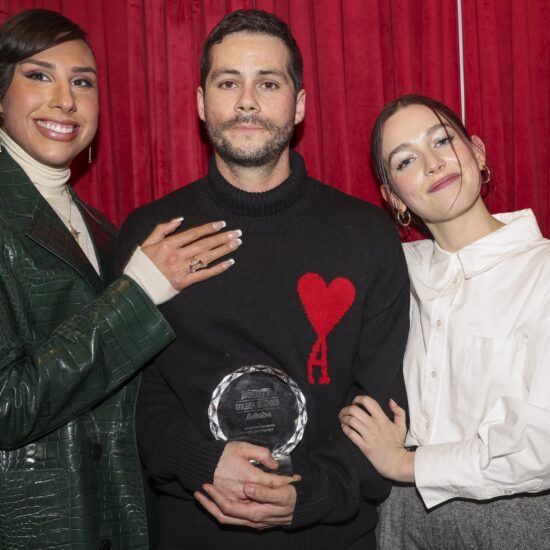
TIFF: As great she is, Brian Tyree Henry might be even better.
It’s so good to see Jennifer Lawrence play a real person again. Despite the quiet strength she brought to the “Hunger Games” franchise, and the outlandish joy she mined from the likes of “mother!” and “Red Sparrow,” a long run of dreadful “X-Men” sequels and over-cranked David O. Russell fiascos have dulled one of America’s brightest young movie stars to the point where it’s become easy to forget how good she can be.
If nothing else, the microscopically small but sincerely moving “Causeway” — which the actress also produced under her Excellent Cadaver banner — offers a strong reminder of what Lawrence can bring to the screen when she’s cast as a recognizable human being as opposed to a mutant shapeshifter or a David O. Russell character (sorry, but “American Hustle” deserves its own separate ding).
Army Corps engineer Lynsey wanted to leave her hometown so badly she went to Afghanistan; there, she suffered a brain injury that has forced her return. Lawrence’s raw but restrained performance in “Causeway” also marks a return to the sort of hardscrabble indie drama that launched her career, and a return to the kind of unflinching, open-faced, recklessly stoic survivors whom she portrays with the natural presence of someone whose own life is on the line. Her turn as Lynsey shows that Lawrence knows her own strengths and isn’t afraid to make herself vulnerable to show it.
That’s not the reason why this ultra-modest character study — sheared down to the point that you can almost see it shivering — works in spite of its small ambitions. “Causeway” holds together because Lawrence may not even be the movie’s best performance.
Shot in 2019 and snipped into shape during the pandemic, “Causeway” begins with Lynsey returning home from war and receiving what any fan of American theater would consider a hero’s welcome: Several weeks of rehab with Jayne Houdyshell. When Sharon first takes Lynsey into her care, the young engineer is just starting to recover from an IED blast. She can’t walk on her own strength or even find her mouth with her toothbrush, but progress comes quickly to someone who’s itching to re-enlist. First-time film director Lila Neugebauer’s camera begins to move when Lynsey does, and it isn’t long before the stiff wide shots of the movie’s opening scenes give way to a more relaxed flow as Lynsey arrives back home New Orleans and begins cleaning pools as she waits to be declared fit for redeployment.
Home is not a place that Lynsey finds particularly relaxing. She tells Sharon that someone will pick her up from the bus station, but no one does. Her father is out of the picture, she only speaks of her brother in the past tense, and her mom (Linda Emond, nuanced in a role that feels like it lost a few layers in the edit) seems hopelessly distracted and self-involved; maybe that’s a defense mechanism she developed in response to an implosive family dynamic. Or maybe it’s Lynsey who retreated into herself when things got bad, cloaking herself in some camouflage and running off to fix broken things on the other side of the world.
Fixing herself will prove more difficult. Her eagerness finds her behind the wheel of a car sooner than she’s ready, which in turn steers her towards the auto body shop where she meets a man with some internal (and external) damage of his own. James Aucoin is played by the great Brian Tyree Henry, and it sure is a thing of beauty to see him play a real person again, too (while “Atlanta” continues to be a televised showcase for Henry’s generational talent, the “Widows” actor has spent the last four years grinding it out studio fare like “Eternals” and “Bullet Train,” even though he was naturally the best part of both).
The complexion of this movie is changed entirely by James’ arrival on the scene, as he and Lynsey immediately gravitate toward each other through the magnetic force of mutual understanding. Neither character would be able to explain whatever forces of the universe might be galvanizing their unexpected bond — whatever physical attraction James might have to Lynsey is tempered by his self-disgust — and so the moment they meet is also the moment when “Causeway” comes alive with dramatic possibility. Alex Somers’ glassy ambient score has already told us what kind of movie this is going to be (a delicate, understated indie drama that’s deep with pain but always leaves room for hope), and yet James and Lynsey come together in a way that allows for a rare life force to percolate inside the story’s ultra-predictable trajectory.
Credited to Luke Goebel, Elizabeth Sanders, and “My Year of Rest and Relaxation” author Ottessa Moshfegh, the film’s patchy but perceptive script essentially follows its two lead characters as they have a series of hushed and probing — but not too probing — conversations in different hangout spots across residential NOLA. Certain shots from Lawrence and Henry’s recent films might cost more than this entire movie, but the city of New Orleans adds value where it can, with assists from legendary production designer Jack Fisk and “Wildlife” cinematographer Diego García, who tease a emotional texture from even the most banal locations. The changes of scenery gradually map the tectonic formation of a new friendship. She’s itching to run away from her pain, while he can barely walk without betraying his own (the details of which are best left for Henry to share himself); over time, they nudge one another in opposite directions, all the while moving closer towards a shared sense of home.
No one is reinventing the wheel here, but Lawrence and Henry are such a prickly and believable pair of broken people that even the scenes where nothing much happens seem charged with a healing electricity. These are characters who have held their breaths for most of their lives, and there’s a powerful humanity in how they finally give each other permission to exhale (even if the one scene where they fight is so fantastic that it left me wishing the rest of the film hadn’t been quite so tranquil).
Lawrence knows just where to crack Lynsey open, and Henry is spine-tinglingly great as he wrestles with the wants and needs of a man who doesn’t always believe he deserves to be alive; the scenes in which James opens up about his pain are so powerfully affecting because Henry’s downcast gaze and half-swallowed voice allow you to feel his character risking more of the same abandonment that’s followed him for so long. His tragedy happened on the causeway, and yet — to put a finer point on this than Neugebauer’s gentle film ever does — it’s the roads that Lynsey and James pave for each other that lead them over their lowest points.
This could all feel schematic in lesser hands, but Neugebauer gives Lawrence and Henry the space they need to make the film’s characters feel like real people. As a result, the inevitable glimmer of hope they share at the end is as honest as the hurt that guided them to it.
Grade: B-
“Causeway” premiered at the 2022 Toronto International Film Festival. A24 and Apple will release it in theaters and on Apple TV+ on Friday, November 4.
Sign Up: Stay on top of the latest breaking film and TV news! Sign up for our Email Newsletters here.













